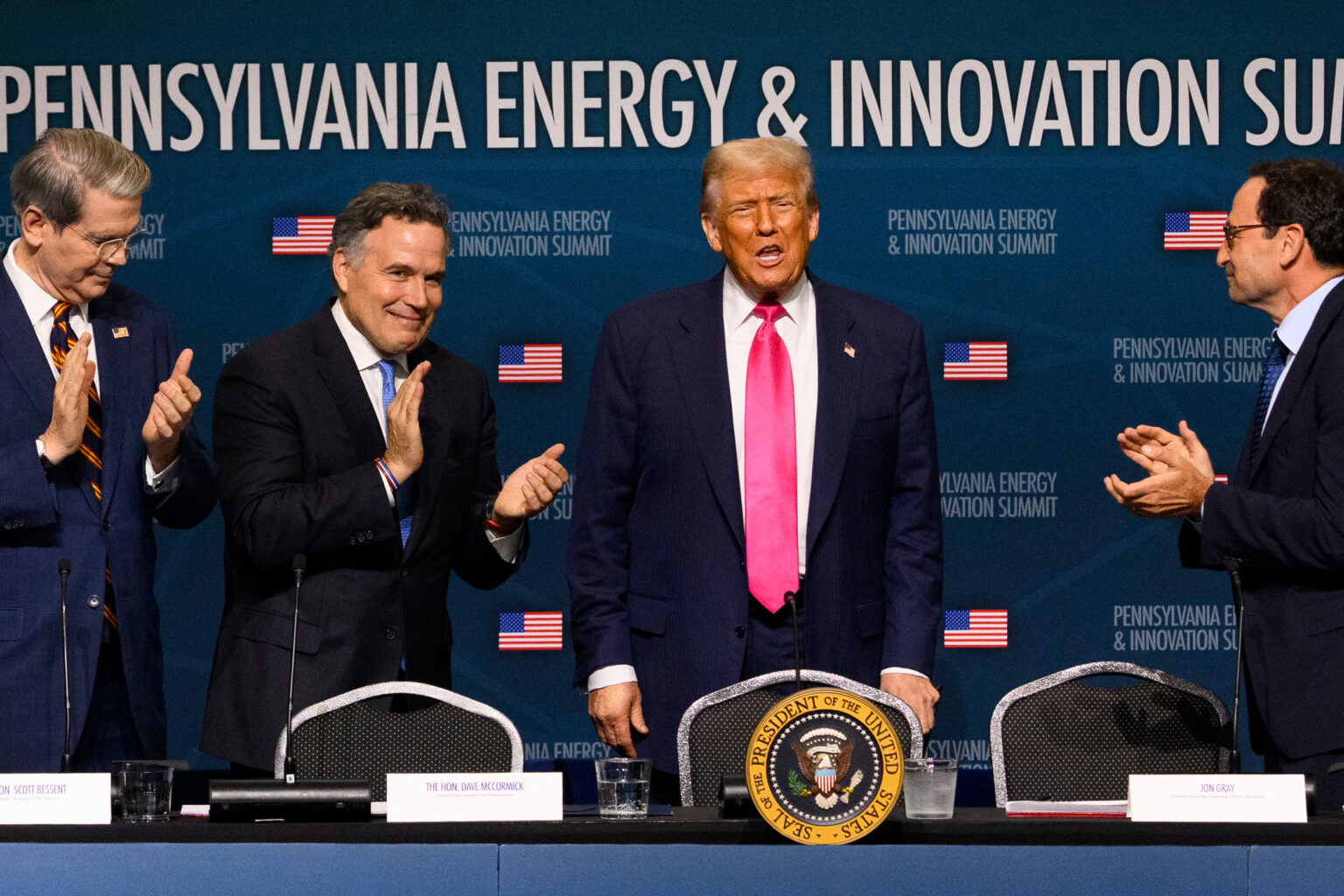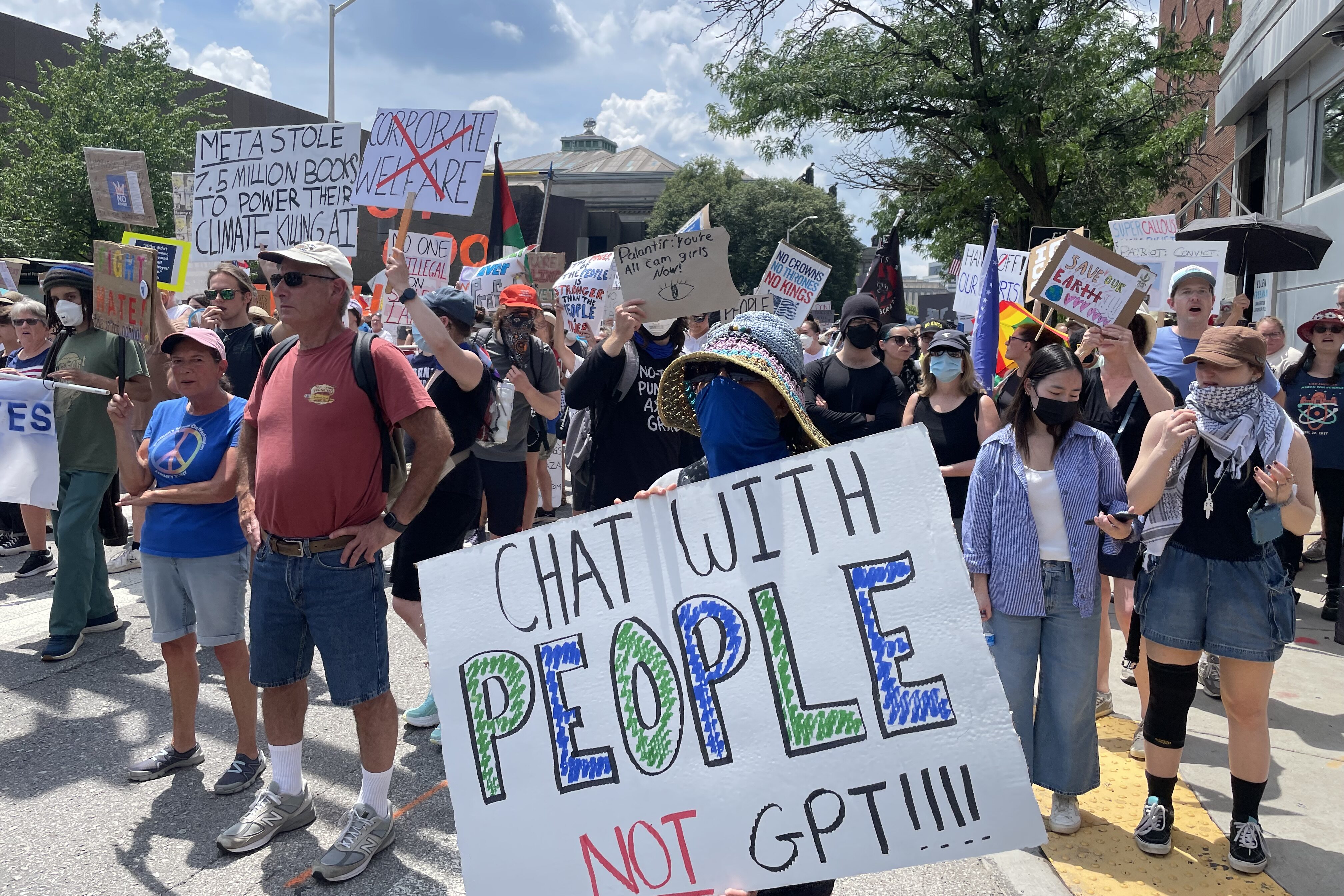Author: Marianne Lavelle, Kiley Bense Published: 7/15/2025 Inside Climate News
While government, energy, tech and banking leaders held a summit, protestors warned of worsening climate pollution and a future shaped by “the worst people on Earth.”

PITTSBURGH—Flanked by titans of the fossil fuel, tech and finance industries, President Donald Trump on Tuesday hailed $90 billion in private investments aimed at building a massive artificial intelligence hub around Pennsylvania’s natural gas resources.
“This is a really triumphant day for the people of the Commonwealth and for the United States of America,” Trump said. “Today’s commitments are ensuring the future will be designed and built right here in Pennsylvania, right here in Pittsburgh, and I have to say, the United States of America.”
Touted by Trump as the largest private investment in the state’s history, the plan would solidify a market for the abundant natural gas resources that have made Pennsylvania the nation’s No. 2 producer, second only to Texas. It also would support a major expansion of fossil fuel production in defiance of the science showing that the world needs to drive down greenhouse gas emissions to avoid the worst impacts of climate change.
While corporate chieftains and politicos gathered at Carnegie Mellon University at what was billed as the inaugural Pennsylvania Energy and Innovation Summit, a protest opposing the event and CMU’s decision to host it took place down the street. Hundreds of professors, college students, Pittsburgh residents and activists marched on Forbes Avenue toward the campus, where they were stopped by a line of police in riot gear.
“We the people of Pittsburgh care desperately about climate,” said Tracy Baton, director of Indivisible Pittsburgh and a co-organizer of the protest. “We’re not going back” to the unchecked industrial pollution that plagued Pittsburgh for so many years, she said.
“A lot of us are outraged that Trump thinks he can visit our campus when he is disrupting our research grants and terrorizing our students,” said Carrie McDonough, a chemistry professor at CMU who wore a lab coat to the protest. McDonough studies how environmental pollution affects aquatic ecosystems and human health. She said she and many other faculty members had lost funding as the Trump administration made drastic cuts to federal research grants across the country.
“As far as I can tell the energy and innovation policy they are talking about is building more data centers in western PA,” and fracking more to fuel them, she said. “Which isn’t innovative.”

But Trump’s team—including at least five cabinet secretaries—were on hand to make the case that falling behind in artificial intelligence and fossil energy production were among the greatest risks that the nation faced, not climate change.
“My bet, it’s Russian psyops that’s driving a lot of this whole era of climate extremism,” said Interior Secretary Doug Burgum, who also leads Trump’s National Energy Dominance Council. “We should get up every day and thank every person who had anything to do with the technology that drove the shale revolution,” he said, referring to the production of oil and gas through high-volume hydraulic fracturing of shale rock.
Burgum said the energy from fossil fuels released from shale would save the nation from “losing the AI arms race,” which the Trump administration viewed as an existential threat.
“Don’t call them data centers, please,” Burgum said. “It’s intelligence manufacturing. You take electricity, you directly turn it into intelligence. That intelligence is the base productivity gain for every industry.”
Crossroads for Two Revolutions
At least 15 corporate chief executives attended the summit, which was organized by Sen. Dave McCormick (R-Pa.), a former hedge fund manager now serving his first term in Congress after a razor-thin victory in November.
“There is an incredibly significant revolution going on in energy and in artificial intelligence,” McCormick said. “And the crossroads for those two revolutions is Pennsylvania.”
McCormick and Trump recalled it was only a year ago that both were together on the campaign trail about 35 miles north in Butler, Pennsylvania, where Trump narrowly avoided an assassination attempt.

“Twelve months later, look at what we have,” Trump said. “We have the hottest country, and we’re going to keep it that way.”
Among the CEOs on hand were ExxonMobil’s Darren Woods, BlackRock’s Larry Fink and Bechtel’s Brendan Bechtel. Google and Amazon also sent high-ranking corporate officers, with the tech giants responsible for two of the biggest deals highlighted at the summit.
Amazon announced last month it plans to invest at least $20 billion in building data centers for AI and cloud computing in Pennsylvania. Google said Tuesday it would be investing $25 billion. A $15 billion deal was struck between EQT Corporation and the Homer City Redevelopment Authority to provide natural gas to fuel what will be the nation’s largest natural gas plant, being built to fuel an AI and high-performance computing center on the site of what was once the state’s largest coal power plant. Blackstone, the world’s largest alternative asset manager, announced it will invest more than $25 billion to build out digital and energy infrastructure in the state.
“By co-locating data centers next to the natural gas, we eliminate the enormous cost and time delays with these projects, which makes us super bullish on this state,” said Jon Gray, Blackstone’s president and chief operating officer, who sat at Trump’s side at a U-shaped conference table of cabinet members and executives set up in CMU’s Wiegand Gym.
There were a handful of non-fossil fuel announcements of the day. Google and Brookfield Asset Management unveiled what they said was the world’s largest corporate clean power deal for hydroelectricity. Under the agreement, Google would be able to procure up to 3,000 megawatts of hydropower—the equivalent of one and a half Hoover Dams—from hydro projects across the United States that will be relicensed, overhauled or upgraded by Brookfield, starting with the $3 billion modernization of two older dams on Pennsylvania’s Susquehanna River. And Westinghouse, headquartered near Pittsburgh, said it expects 15,000 new jobs in southwestern Pennsylvania due to its plan to have 10 new large nuclear reactors under construction across the country by 2030.
Shapiro Embraces Pro-Business Role
Pennsylvania’s Democratic governor, Josh Shapiro, also attended, ignoring local environmentalists’ opposition to his participation and laying some bipartisan claim to the Trump administration’s plans for economic development in one of the nation’s most politically important swing states. Shapiro is widely seen as a potential standard-bearer for the Democratic party in the future, but his support of the fracking industry has cut against him with some of the party’s more progressive voters.
Environmentalists in Pennsylvania spoke out against McCormick’s summit and Shapiro’s involvement in it. A letter sent to Shapiro criticizing his attendance was signed by more than 25 environmental organizations in the state. “It is really a tripling down on dirty fossil fuels for the U.S.,” said Delaware Riverkeeper Maya van Rossum, a letter signee, of the event. Van Rossum decried the pollution, greenhouse gas emissions and public health impacts of fracking and said Shapiro’s presence was an endorsement of Trump’s fossil fuel friendly energy policies. “This is really a perilous path that we are on towards a devastating future for Pennsylvania,” she said.